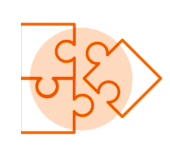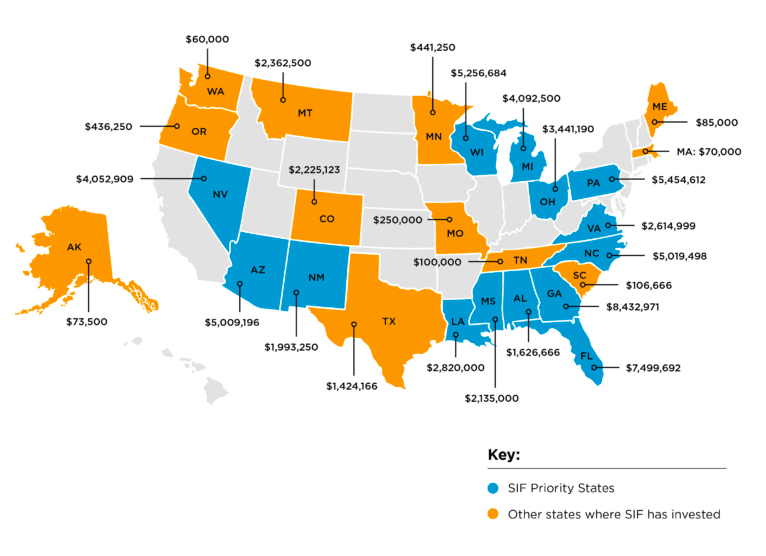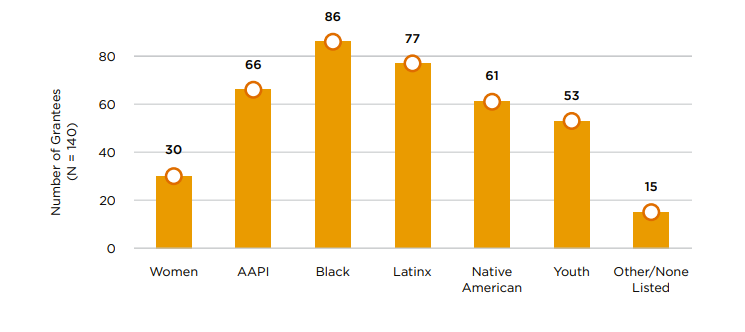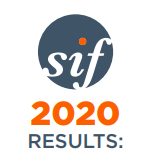State Infrastructure Fund

Our Mission
The State Infrastructure Fund (SIF) is a non-partisan, 501 (C)(3) donor collaborative fund at NEO Philanthropy Inc. that works to increase civic participation and advance voting rights among Black, Indigenous and People of Color (BIPOC) and other historically underrepresented communities. SIF advances this mission by providing consistent, long-term funding to networks of state-based and state-focused nonpartisan organizations that engage their communities through civic engagement, education and advocacy, organizing, voter mobilization as well as reducing voter suppression and protect the right to vote through Election Protection/voter protection and voting rights litigation.
Increasing civic engagement isn’t just an ‘election-year thing‘ with SIF. They understand that this requires funding and other resources for organizing and infrastructure over a consistent periods of time and targeted to key states and communities that otherwise wouldn‘t have them. By looking systematically and strategically and seeing where funders can have most impact over time, SIF is getting the kind of outcomes we all like to see.
—Hildy Simmons, Philanthropic/Donor
Advised Fund Consultant
In November 2020, 159 million people turned out to vote—turnout not seen in more than a century. And they did so in the face of a deadly pandemic, economic recession, and racial conflict. Central to this transformation is NEO Philanthropy’s State Infrastructure Fund (SIF). Read the history of SIF leading up to this moment in a new report, “Slow and Steady Wins the Race: 10 Years of the State Infrastructure Fund”
Our Goals
The State Infrastructure Fund seeks to advance the following four goals:
1
Increase voter participation
among people in historically underrepresented communities in select states.
2
Remove barriers to voting and promote positive changes
to voting laws and election administration through public education, organizing and litigation.
3
Increase the capacity, skills and coordination of networks of organizations
that represent and engage historically underrepresented communities within select states
4
Deepen alignment, coordination and planning
across national and state litigation, voting rights and civic engagement organizations and funders in key states.
Our Strategy
State Infrastructure Fund: Theory of Change and Strategy
MISSION:
To increase voter awareness and protect voting rights in historically underrepresented communities by building a permanent civic engagement and voting rights infrastructure on the ground.

To increase voter participation and protect voting rights in historically underrepresented communities, the SIF strategy is grounded in two assumptions:

Assumption 1
Voting is critical to positive community change. If people vote and elect community representatives that share their values, they will have a stronger voice in decisions and issues that affect their communities.

Assumption 2
Even the most robust civic/voter engagement programs won’t be successful if barriers to tactics keep people from accessing the ballot box.
Based on these two assumptions, SIF funds year-round civic engagement programs in states that increase voter participation rates in historically underrepresented communities and protect voting rights by tying voting to salient issues through year-round advocacy, organizing, leadership development and voter mobilization efforts integrated with programs that protect and advance the voting rights of historically disenfranchised communities year-round through litigation, monitoring, education and robust Election Protection efforts.

Year-round Civic Engagement
Coordinated strategies to advance community organizing, leadership development, policy advocacy and voter education, engagement and mobilization.

Voting Rights and Election Protection
Proactive and defensive efforts to ensure that voting is accessible and fair for all Americans, including administrative monitoring, Election Protection and litigation
These funding areas are deeply interrelated and interdependent parts of a comprehensive strategy that promotes voting and civic engagement in historically underrepresented communities.
Simply put, if people do not make the connection between the political process and issues affecting their daily lives, they will be less likely to be civically engaged and vote. And even the most robust, genuine and thoughtful civic and voter engagement programs will not be successful if barriers to voting and suppressive tactics prevent people from accessing the ballot box.
Building State Infrastructure
By funding organizations on the ground that truly represent their communities, SIF shows that its strategy is designed to support and build lasting organizational capacity within organizations as well as strong coordinated networks of civic engagement and voting rights groups so that they can run effective programs and respond to changing circumstances at the state level, year in and year out.
At the core of SIF’s strategy is supporting state-based/focused organizations and networks. SIF also provides support to national and regional organizations focused in states that help groups on the ground by providing additional resources, expertise, information and coordination to state groups. This includes voting rights litigation by national civil rights litigation groups and Election Protection coordination and hotlines.
The State Infrastructure Fund calls these networks “State Infrastructure.”
What is State Infrastructure?
SIF defines state infrastructure as the network of well-resourced organizations with strong leaders who collaborate in planning and carrying out right-sized civic engagement, voting, and voting rights efforts in communities across a state. These infrastructures can be at different stages of development so SIF develops tailored strategies for support that reflect each state’s unique capacities, challenges, and opportunities. Key indicators of a strong infrastructure are: multiple organizations working in marginalized communities; capacity to plan, develop, and execute complex and consistent programs; the ability to use data to show positive results; and the ability to pivot quickly responding to timely issues.
The Georgia graphic exemplifies how SIF’s integrated strategy comes together in a state.
SIF Grantees in Action: GEORGIA

Civic Engagement + Election Protection
- Women Engaged
- CPACS
- 9to5 Georgia
Civic Engagement
- Faith in Public Life
- Georgia Shift
Election Protection + Voting Rights
- Lawyers Committee for Civil Rights Under the Law
- Common Cause
- League of Women Voters
Civic Engagement + Election Protection + Voting Rights
- ProGeorgia
- Georgia Coalition for the People’s Agenda
- New Georgia Project
- AAAJ-Atlanta
- GALEO
- NAACP
State Focused Funding
Since its inception in 2010, SIF has raised over ~$170 million to support 140+ state-based and national nonpartisan groups. Additionally, it has distributed it to state-based and national organizations that implement an integrated civic engagement and voting rights strategy in the states in BIPOC and underrepresented communities. The graph below provides a breakdown of SIF funding from 2010 -2021.

State-based Funding Total:
$67,083,622
National Funding Allocation:
National Voting Rights: $32,349,201
National Civic Engagement: $16,293,838
Constituencies Served
As part of its strategy, SIF intentionally invests in smaller Black, Indigenous and People of Color (BIPOC)-led organizations in its Priority States. Historically many of these organizations have been unable to access large national funding sources, which deeply hindered their ability to build capacity, grow their programs, or be considered valuable within the context of the state landscape. Currently, 87% of SIF’s 140 grantees are BIPOC-led. This focus has allowed many organizations to grow their programs and capacity and become leaders within the state’s civic engagement and voting rights infrastructure.
A recent survey of SIF grantees asking them to identify their primary constituencies found that nearly all worked in multiple communities.

Technical Assistance and Capacity-Building
The State Infrastructure Funds provides technical assistance and capacity-building support to its grantees in areas of communications, program growth and support, and organizational development. This includes such things as strengthening communications structures, messaging coordination, relational and digital organizing, professional development and legal support. In 2020, this technical assistance was of vital importance as SIF’s grantees were forced to shift their programming in response to the COVID-19 global pandemic. These trainings help grantees identify the tools and tactics they need to help them develop digital/online organizing programs and content that fit their particular needs. Furthermore, SIF assisted grantees to develop new digital and online civic engagement programs focusing primarily on VBM/Absentee Ballot voting. SIF opened the trainings to grantees funded by the 13 funder members of the Collaborative Fund Alignment Group, resulting in more than 225 leaders from more than 100 organizations participating.
Voting Rights Litigation and Election Protection
The State Infrastructure Fund created and continues to coordinate the Voting Rights Working Group (otherwise known as the Litigation Collaborative) to engage in legal action on behalf of communities most directly impacted by voter suppression. In 2013, the Shelby County v. Holder decision severely undermined Section 5 of the Voting Rights Act. In response, SIF launched the collaborative which is comprised of 12 of the most established and diverse civil rights legal organizations in the country. As such, the Collaborative has become one of the nation’s most powerful forces for protecting voting rights and battling voter suppression. Members meet regularly to identify, discuss and share litigation strategies and align efforts to capitalize on each group’s capacities and experience. To date, collaborative members have been involved in more than 126 voting rights cases, at least 81 of which involved issues related to the recent 2020 elections. Through the work of the Litigation Collaborative, SIF is able to expand its reach far beyond its priority states and have an impact on protecting the vote in all 50 states.
In addition to voting rights litigation, SIF also supports both national and state organizations that engage in year-round Election Protection (EP) programming and communications to help communities understand their rights, as well as the obstacles they may face when voting, and ultimately protect those rights throughout the entire election process. In addition to nation legal oversight, the overall EP program in 2020 was comprised of over 43 field and legal mobilization programs that included multi-lingual voter hotlines and the coordination of volunteer attorneys and field staff positioned in communities to assist voters in real-time.
Voting Rights Litigation 2020
Voting Rights Litigation Collaborative’s
12 member organizations led litigation, or were involved in,
81 cases related to the 2020 elections in 28 states and Puerto Rico.
Issues litigated include:
- Voter registration and vote-by-mail deadlines
- Early voting processes and procedures
- Vote-by-mail and absentee ballot procedures
- Voter purges/list maintenance
- Voter ID and proof-of-citizenship requirements
- Restrictions to ballot collection and
- assistance efforts
- Expansion of curbside voting
- Polling place closures
- Felon disenfranchisement
- Voter-directed misinformation/disinformation (e.g., robocalls)
- Language access
- Challenges to the Voting Rights Act
- Challenges to election results certification
- Challenges to invalidate ballots cast during election
Annual Voting Rights Convening
To facilitate alignment and communication within and across the voting rights field, SIF organizes the Annual Voting Rights Convening, which brings together litigators, policy advocates, grassroots organizers, communications specialists and funders working to promote and protect voting rights. The purpose of the convening is to allow voting rights leaders to share information, brainstorm strategies and discuss long-and short-term opportunities for maintaining an effective, proactive and comprehensive voting rights movement.
SIF 2020 Key Results
Below is a core example of the aggregated results from our grantees funded in the 2020 election cycle.

$56M
IN FUNDING TO
140
ORGANIZATIONS IN
17
STATES:
AL • AZ • CO • FL • GA • LA
MI • MS • MT • NV • NM • NC
OH • PA • TX • VA • WI

2.3M+
NEW VOTERS
added to grantee contact
universes through
online town hall meetings
and events

100M+
VOTER CONTACTS DURING
2020 ELECTION CYCLE
These were primarily BIPOC
and low-propensity voters

SIF-supported national
media campaign, “Get the
Facts,” which featured
celebrities and influentials
providing information on all
aspects of voting, had:
10M+
IMPRESSIONS
10M+
VIDEO PLAYS

SIF-supported Litigation
Collaborative—a coalition
of 11 national civil rights
organizations—took on
125+
VOTING RIGHTS CASES

SIF-supported national
media campaign, “Your
Voice is Your Vote,” aimed at
reaching BIPOC, disabled and
low-propensity voters ages
18−55 in 13 states, had:
40M
SOCIAL MEDIA IMPRESSIONS
4.2M
PODCAST HITS
15.2M
BLACK RADIO LISTENS
45M
SPANISH IMPRESSIONS

To help grantees pivot from
in-person canvassing to digital
outreach, organizing and
engagement due to COVID-19,
SIF provided:
3M
IN TRAINING, COACHING,
CONTENT DEVELOPMENT/SUPPORT
AND INCREASED SMS CAPACITY TO
270 INDIVIUALS
—from—
150 Orgs

Election Protection funding
that supported 43 community
field programs involving:
25,000+
Grassroots organizers and
legal counsel
75+
Election-related litigation cases
filed in 27 states and Puerto Rico
243,000+
Calls received* to hotlines
in all 50 states that engaged
42,000 legal volunteers
* A 93% increase over 2016
What Do Donors Get from Participating in SIF?
SIF provides a range of collaborative opportunities for new and existing donors to support civic engagement and voting rights, including litigation. Donors point to several advantages to joining SIF, especially the chance for donors to have the kind of deeper impact and broad reach that would have been impossible individually. SIF also offers donors a place for strategic learning and relationship building with their peers, experts and grantees and above all, a smart, coordinated and proven platform for strategic investment.
Specific ways donors say their participation in SIF adds value to their work:
Track Record: As the most established civic engagement and voting rights collaborative fund in the country, SIF’s growth during its first decade and track record engender confidence and commitment among its donor members and the larger field.
SIF’s support has given our new state Table the leverage to approach other funders so that, ultimately, Alabama will have the civic
—Evan Milligan, Executive Director,
infrastructure it needs and deserves.”
Alabama Forward
Strategy: SIF’s creative and entrepreneurial approach melds donors’ individual goals and priorities with a larger and cohesive long-term strategy that is more than the sum of its parts.
Focus on communities of color and historically underrepresented constituencies: SIF is one of the few donor democracy collaboratives that prioritize BIPOC communities and other disenfranchised and underrepresented constituencies—and uses a racial equity/justice lens—in efforts to increase civic participation, reduce voter suppression and support policy reforms that engage and empower BIPOC communities.
Knowledge & Expertise: As established leaders in the civic engagement, voting rights and philanthropic fields, SIF’s program staff provide detailed and strategic analyses of the state and national landscape for donors, including a dedicated “donor portal” and mapping that identifies where funding will have the most impact.
Learning: SIF offers peer-to peer-learning for members who participate in regular conference calls and meetings to discuss emerging issues, strategic plans and specific funding recommendations.
Leverage: SIF brings more resources to critical issues by leveraging and aligning the investments of state and national donors and other collaborative funds.
Efficiency & Flexibility: SIF’s flexible and responsive funding mechanism allows national funders to not only make more targeted grants in multiple geographies but to do it rapidly and responsively—something for which most larger foundations aren’t structured.
SIF has the right strategy. They go to the communities and support the people who are working in the community every day, not just during high-profile elections.”
—Helen Butler, Georgia Coalition
for the People’s Agenda
National – State Funding Connections: Through their SIF membership, national funders have the chance to support state-level work that they may not know about or be able to fund directly and state funders are able to see how the efforts they’re supporting are part of a national movement.
Resources and Updates
PDF: Slow and Steady Wins the Race: Ten Years of the State Infrastructure Fund | Written by Cynthia M. Gibson

For more information about State Infrastructure Fund please visit our contact page